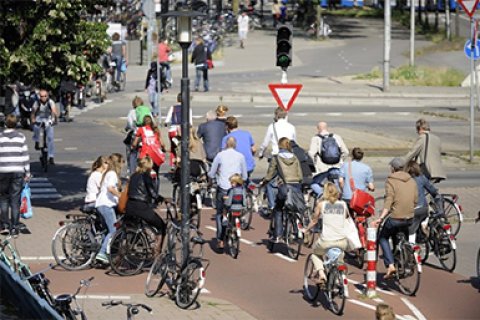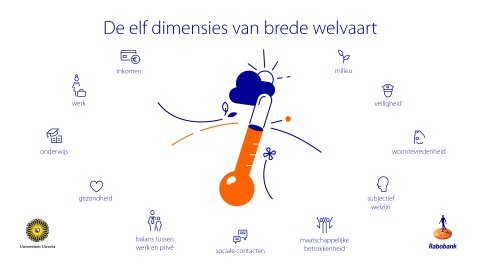Better Well-being Index
How can we best measure welfare and what dimensions are important? Gross domestic product (GDP) is often used to measure people's prosperity. However, economic growth is not the only thing that determines the well-being of Dutch people. We therefore explicitly opt for one integral measure of comprehensive well-being: the Better Well-being Index (BWI).

Better Well-being Index
The real wealth of a society is its citizens’ wellbeing. Societies are complex and do not function in a narrow economic sense, but in a variety of dimensions. The Better Well-being Index (BWI) measures and weighs 11 dimensions that reflect the comprehensive well-being of Dutch people: safety, environment, health, subjective well-being, work-life balance, housing, education, material prosperity, civic engagement, social relations and jobs. The BWI is the Netherlands' first comprehensive well-being index and an initiative of Utrecht University's Institutions for Open Societies research network in collaboration with RaboResearch. This BWI appears to develop very differently from GDP per capita, especially during and after the crisis of recent years, which is particularly striking because until now GDP has often been used to measure the (economic) well-being of the Dutch. So money (alone) does not make people happy.

One integral measure
We explicitly choose one integral indicator, making the relationship between different dimensions explicit. This enables international measurement and comparison of better well-being. It makes the trade-offs between different dimensions explicit and thus disciplines the debate on better well-being. Working with a single indicator also ensures that analyses and comparisons of well-being between regions and over time remain manageable. Moreover, the BWI thus aligns with and builds on the framework of the OECD's Better Life Initiative. This opens up the possibility of eventually arriving at an international measurement and comparison of better well-being. Researchers from different backgrounds are working to continuously improve the index and reflect on the results in order to reach sound conclusions. Read more about various spin-offs and projects.
Background
The limitations of the concept of gross domestic product (GDP) to measure people's well-being have been discussed since the 1960s. It was said to be too one-sided. There have been initiatives towards more inclusive or broader concepts of well-being over the years but the ideal measuring stick did not yet seem to have been found. With the BWI, the initiators want to reinforce the trend towards measuring welfare more broadly than purely by economic indicators. With this, the BWI has a pioneering role in the Netherlands, partly due to its close cooperation with the OECD and similar research initiatives in the Netherlands, as well as the academic expertise of an interdisciplinary team of researchers at UU. Meanwhile, similar initiatives such as CBS's Brede Welvaart Monitor have also been developed.
The BWI project started in 2016 in collaboration with Rabobank's RaboResearch department. In December 2016, the first Better Well-being Index was launched, and since then the BWI team at Utrecht University and RaboResearch have been working together to renew and refine the BWI every year.

